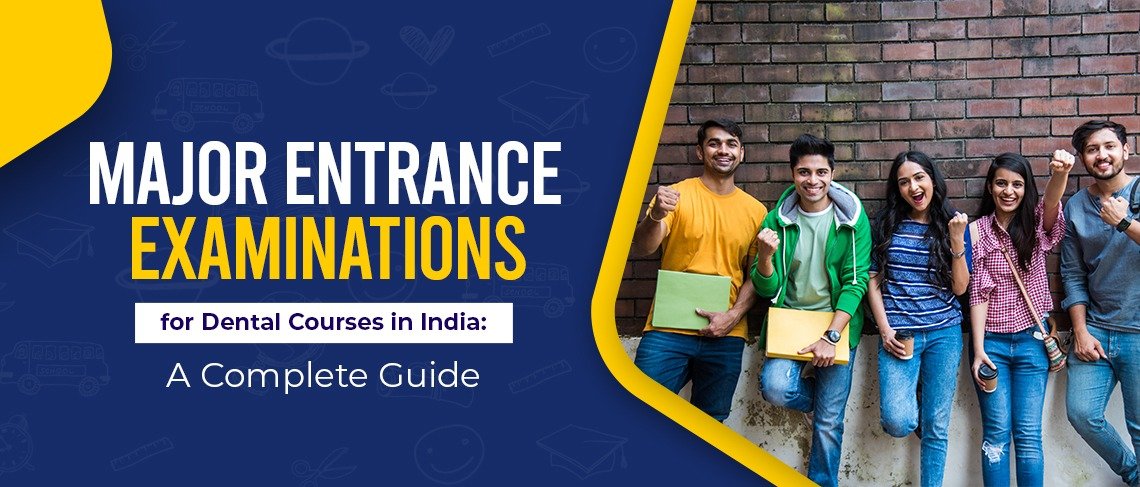The first and most important step if you want to work as a dentist in India is to pass the main dental entrance exams. There are many fulfilling job opportunities in dentistry, ranging from becoming a general dentist to specializing in fields like prosthodontics, orthodontics, and oral surgery. Passing the appropriate entrance exams marks the start of the voyage. We will go over the main admission tests, eligibility requirements, exam patterns, and preparation advice for dentistry programs in India in this extensive guide.
1. NEET-UG (National Eligibility cum Entrance Test – Undergraduate)
NEET-UG is the most important entrance exam for aspirants seeking admission to BDS (Bachelor of Dental Surgery) courses in India. Introduced by the Government of India and conducted by the National Testing Agency (NTA), NEET-UG is mandatory for dental aspirants.
Key Highlights:
- Eligibility:
- Candidates must have passed 10+2 with Physics, Chemistry, Biology/Biotechnology, and English.
- Minimum aggregate marks of 50% for general category and 40% for SC/ST/OBC.
- The candidate should be at least 17 years old by December 31 of the admission year.
- Exam Pattern:
- The exam consists of 200 multiple-choice questions (180 to be answered).
- Subjects: Physics, Chemistry, and Biology (Botany & Zoology).
- Duration: 3 hours 20 minutes.
- Total marks: 720.
- Application Process:
- Applications are submitted online through the official NTA website (https://neet.nta.nic.in).
- Selection Process:
- Admission is based on NEET score and counseling.
Preparation Tips for NEET-UG:
- Focus on NCERT textbooks.
- Practice previous years’ question papers.
- Time management and mock tests are key.
- Join a coaching institute if necessary.
2. NEET-MDS (National Eligibility cum Entrance Test – Masters of Dental Surgery)
For dental graduates who wish to specialize in various dental fields, NEET-MDS is the national-level entrance exam for postgraduate dental courses.
Key Highlights:
- Eligibility:
- A BDS degree from a recognized dental college.
- Completion of the one-year compulsory rotatory internship.
- Registration with the State Dental Council or DCI.
- Exam Pattern:
- Single-day, computer-based exam.
- 240 multiple-choice questions.
- Syllabus based on the BDS curriculum.
- Duration: 3 hours.
- Application Process:
- Conducted by the National Board of Examinations (NBE).
- Applications are accepted online (https://natboard.edu.in).
- Selection Process:
- Merit-based seat allocation through counseling.
Preparation Tips for NEET-MDS:
- Focus on conceptual understanding.
- Study standard textbooks and reference materials.
- Take online test series.
- Create short notes for revision.
3. AIIMS Entrance Exam (Discontinued but Historical Reference)
Before the integration into NEET, the AIIMS Entrance Exam for MDS was a prestigious exam for post-graduate dental studies at AIIMS. Now, admission to AIIMS dental courses is based on NEET scores.
4. Army Dental Corps Recruitment Exam
For those who aspire to serve as dentists in the Indian Army, there is a recruitment process through the Army Dental Corps.
Key Highlights:
- Eligibility:
- BDS/MDS from a recognized university.
- Must have appeared and qualified in NEET-MDS.
- Should have a permanent dental registration certificate.
- Selection Process:
- Shortlisting based on NEET-MDS scores.
- Personal interview and medical examination.
5. State-Level Entrance Examinations (Prior to NEET Implementation)
Before NEET became the unified entrance exam, several states conducted their own dental entrance tests. Although these have now been replaced by NEET, students should still keep an eye out for any state-specific counseling procedures.
6. All India Post Graduate Dental Entrance Exam (AIPGDEE) – (Discontinued)
AIPGDEE was conducted by AIIMS for MDS admissions in government dental colleges across India. Now, this has been replaced by NEET-MDS.
Important Points to Remember:
- Counseling Process:
- For BDS and MDS admissions, counseling is conducted through MCC (Medical Counseling Committee) and State Counseling Authorities.
- There are separate counseling processes for All India Quota seats and State Quota seats.
- Reservation Policies:
- Reservations for SC, ST, OBC, and EWS categories apply according to government norms.
How to Prepare for Dental Entrance Examinations:
1. Start Early:
Begin your preparation during your 11th and 12th standard for NEET-UG and during your internship or final year of BDS for NEET-MDS.
2. Choose the Right Study Material:
- For NEET-UG: NCERT books, MTG NEET guides, and previous years’ question papers.
- For NEET-MDS: Textbooks like Shafers, Orban’s, Grossman, and MCQ books by Dental Pulse and Neeraj Wadhwan.
3. Mock Tests and Time Management:
Regular mock tests help build confidence and improve speed.
4. Focus on Weak Areas:
Identify subjects or topics where you lack confidence and dedicate more time to them.
5. Maintain Good Health and Routine:
Stay healthy, sleep well, and follow a consistent routine.
Being a dentist is a respectable and rewarding vocation. In India, passing the appropriate entrance exams—NEET-UG for undergraduate programs and NEET-MDS for postgraduate programs—is the first step to becoming a successful dentist. Even though the tests are competitive, you can still succeed if you have the proper plan, practice often, and maintain focus. Keep abreast of official information, follow your study schedule, and practice consistently. Passing these tests opens the door to a fantastic profession and the chance to use healthcare to significantly improve people’s lives.
 ONLINE COUNSELLING
ONLINE COUNSELLING


